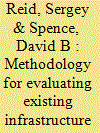| Srl | Item |
| 1 |
ID:
169904


|
|
|
|
|
| Summary/Abstract |
This paper explores how gasoline prices affect the sales of new and used cars in Lebanon. Using a rich dataset on monthly imported cars from 2000 to 2016, a vector autoregressive analysis is used to model different consumer choices between fuel-efficient cars, midsize cars, and fuel-inefficient cars. We report the first empirical evidence on this question from the Middle East and North Africa (MENA) region using individual automobile data. We use within sample and out-of-sample tests to examine whether gasoline prices influence the sale of fuel-efficient cars. Our results show evidence against the hypothesis that rising gasoline prices shift consumers’ demand toward the most fuel-efficient cars.
|
|
|
|
|
|
|
|
|
|
|
|
|
|
|
|
| 2 |
ID:
150768


|
|
|
|
|
| Summary/Abstract |
Recent U.S. state and federal legislation have been implemented with the intent of promoting the diffusion of plug-in electric vehicles (PEVs). Meanwhile, the federal government has passed new regulation aimed at increasing fuel efficiency standards of gasoline powered vehicles in order to reduce greenhouse gas emissions. In this paper, we examine the existing barriers that impact PEV diffusion. We argue that increased fuel efficiency standards coupled with declining gasoline prices conflicts with the implemented PEV incentives. Using a geospatial method, we demonstrate how policymakers can create regionally weighted markets based on consumer surveys to facilitate the development of a national policy for nascent products like the PEVs.
|
|
|
|
|
|
|
|
|
|
|
|
|
|
|
|
| 3 |
ID:
111086


|
|
|
|
|
| Publication |
2012.
|
| Summary/Abstract |
This paper explores price regulation and relative price convergence in the Canadian retail gasoline market. We use monthly data (2000-2010) on retail gasoline prices in 60 Canadian cities to investigate (i) whether the retail gasoline market in Canada has experienced a relative price convergence to the mean, which is expected, given the increased economic integration across Canadian provinces; and (ii) whether the introduction of price regulation mechanisms in New Brunswick and Nova Scotia in July 2006 had any impact on the price convergence in these provinces.
We use a nonlinear panel unit root test and find solid evidence that Canadian retail gasoline markets are well integrated across locales; however, the share of converging cities reveals a significant decline since July of 2006. The impact of price regulation on price convergence is mixed; our results indicate that since the enactment of the regulation in all New Brunswick cities (9) included in the dataset, gasoline prices converge to the national mean. Volatility of price is also significantly reduced. In contrast, in the wake of price regulation in Nova Scotia, all 6 cities of the province are non-convergent to the mean with increased volatility and overall price level.
|
|
|
|
|
|
|
|
|
|
|
|
|
|
|
|
| 4 |
ID:
121294


|
|
|
|
|
| Publication |
2013.
|
| Summary/Abstract |
Governments spend hundreds of billions of dollars annually to subsidize the consumption of fossil fuels without understanding the environmental and economic problems this practice creates. To shed light on these problems, we examine the case of gasoline subsidies using data on gasoline prices in 137 countries for the years 2002-2009. It is useful to study gasoline pricing because gasoline is the most important transportation fuel, and there are data for many countries for the time period of investigation. We find that major oil producers subsidize gasoline consumption by artificially reducing prices; countries with weak institutional capacity also seem to subsidize gasoline, but the effects are weaker. These results suggest that policy interventions to improve institutional capacity could help developing countries in particular reduce their fossil fuel subsidies.
|
|
|
|
|
|
|
|
|
|
|
|
|
|
|
|